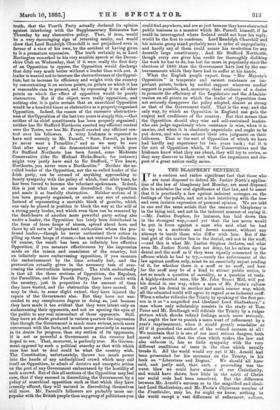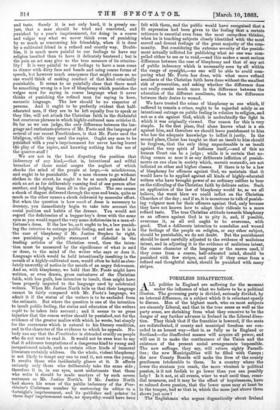THE BLASPHEMY SENTENCE.
TT is a curious and rather significant fact that those who are most disposed to defend Mr. Justice North's applica- tion of the law of blasphemy last Monday, are most disposed also to minimise the real significance of that law, and to assert that it is practically a law against indecent outrages on the feelings of the public, and not a law interfering with the free- and even incisive expression of personal opinion. We are told in one and the same article that the essence of blasphemy is in the thing said, and not in the indecent manner of saying it, —Mr. Justice Stephen, for instance, has laid down this in the strongest way,—and yet that the law never would be put in force against a man who said what he had to say in a moderate and decent manner, without any attempt to insult those who differ with him. But if the real gist of the matter lies in the denial, and not in the scoff_ —and this is what Mr. Justice Stephen declares, and what even Mr. Justice North does not deny, for he mixes up the denial and the scoff as if they were equally concerned in the offence which he had to try,—surely the enforcement of the law against scoffers only, must be an essentially unjust reading of it, for whether there is a scoff or no scoff, and how far the scoff may be of a kind to attract public notice, is not so much a question of morality, as a question of taste. A highly-educated man, like Mr. John Stuart Mill, will put his denial in one way, when a man of Mr. Foote's culture will put his denial in another and much coarser way, which all the educated world will agree to regard as an indecent scoff. When a scholar ridicules the Trinity by speaking of the first per- son in it as "a magnified and idealised Lord Shaftesbury," a man whose only scholarship consists in the study of Tom. Paine and Mr. Bradlaugh will ridicule the Trinity by a vulgar picture which shocks refined feelings much more seriously. But ought the law to punish a mere want of refinement by a year's imprisonment, when it would greatly scandalise lie all if it punished the author of the refined sarcasm at all ? We maintain that it is one of our most serious dangers, both moral and social, that the class which makes the law and also enforces it, has so little sympathy with the very different conditions of taste in the class which usually breaks it. All the world would cry out if Mr. Arnold had been prosecuted for his sarcasms on the Trinity, in his book on "Literature and Dogma." We should all have said, and justly said, that such a proceeding was the worst blow we could have aimed at our Christianity, and would have shown how little in the spirit of Christ our social code had been conceived. But the difference between Mr. Arnold's sarcasm as to the magnified and ideal- ised Lord Shaftesbury, and Mr. Foote's Christmas number of the Freethinker, may be, for aught we know, nothing in the world except a vast difference of refinement, culture,
and taste. Surely it is not only hard, it is grossly un- just, that a man should be tried and convicted, and punished by a year's imprisonment, for doing in a coarse and vulgar way what we never think even of punishing by so much as renouncing his friendship, when it is done by a cultivated friend in a refined and courtly way. Doubt- less, it is much more painful to our feelings to have our religion insulted than to have it delicately bantered ; but is the pain an act may give us the true measure of its crimina- lity? It is very painful to our feelings to have a man come to dinner with dirty face and hands and using coarse forms of speech, bit however much annoyance that might cause us, no one would think of making conduct of that kind criminally punishable. It seems to us painfully clear that there must be something wrong in a law of blasphemy which punishes the vulgar man for saying in coarse language what it never thinks of punishing the refined man for saying in keen, sarcastic language. The law should be no respecter of persons. And it ought to be perfectly evident that half- educated men, if they are to be left equally free to speak as they like, will not attack the Christian faith in the disdainful but courteous phrases in which highly-cultured men criticise it. So far as we can judge, the only difference between the lan- guage and caricature-pictures of Mr. Foote and the language of seieral of our recent Freethinkers, is that Mr. Foote used the bludgeon, while they used the rapier. Ought any man to be punished with a year's imprisonment for never having learnt the play of the rapier, and knowing nothing but the use of the quarter-staff ?
We are not in the least disputing the position that in-decency of any kind,—that is, intentional and wilful breaches of those social usages the neglect of which shocks the mind of the people at large,—is mischievous, and ought to be punishable. If a man chooses to go without clothes in the street, he ought to be as much punished for stich an act as for deliberately running foul of one person after another, and lodging them all in the gutter. The one causes a shock of disgust delivered through the eyes and brain, quite as much as the other causes a shock delivered by muscular effort. But when the question is how much of dress is necessary to decency, you immediately begin to take into account the social position and habits of the dresser. You would not regard the deficiencies of a beggar-boy's dress with the same eyes as you would regard the very same deficiencies in a man-of- fortune's dress. If the law be, as it ought to be, a law punish- ing the intention to outrage public feeling, and not as it is in • the case of blasphemy if Mr. Justice Stephen be right, one punishing a public statement of disbelief in the leading articles of the Christian creed, then the inten- tion must be measured by the significance of what is said or done, to the mind of the writer who says or does it. Language which would be held intentionally insulting in the mouth of a highly-cultivated man, would often be held as abso- lutely unworthy of notice in the mouth of an angry fishwoman. And so, with blasphemy, we hold that Mr. Foote might have written, or even drawn, gross caricatures of the Christian faith, with less guilt, less intention to insult, than might have ' been properly imputed to the language used by celebrated writers. When Mr. Justice North tells us that their language cannot be fairly compared with Mr. Foote's language, we admit it if the status of the writers is to be excluded from the estimate. But where the question is one of the intention to insult public feeling, the status and education of the writers ought to be taken into account ; and it seems to us gross injustice that the coarse writer should be punished, not for the evidence of the greater malice with which he wrote, but simply for the coarseness which is natural to his literary condition, and to the character of the evidence to which he appeals. No- body can say that the Freethinker is obtruded cruelly on people who do not want to read it. It would not be even true to say that it addresses temptations of a dangerous kind to young and inexperienced minds, such as certain other kinds of immoral literature certainly address. On the whole, violent blasphemy is not likely to tempt any one to read it, not even the young. It revolts those who incidentally glance at it. It affects seriously only those who deliberately take the same side ; therefore it is, in our eyes, most unfortunate that those who write it should be made martyrs of by such severe sentences as Mr. Justice North's. If Mr. Justice North had shown his sense of the public indecency of the Free- thinker's Christmas number by sentencing its editor to a fortnight's imprisonment, and its publisher and printer to three days' imprisonment each, no sympathy would have been
felt with them, and the public would have recognised that a fit expression had been given to the feeling that a certain reticence is essential even from the most outspoken thinker, when he is touching subjects closely identified with the most sacred and devout feelings of the great majority of the com- munity. But considering the extreme severity of the punish- ment actually inflicted for publishing what no one was com- pelled either to see or to read,—and this makes a most serious difference between the case of blasphemy and that of any act of public indecency which is necessarily seen by all within the range of eyesight,—no one will be able to avoid com- paring what Mr. Foote has done, with what more refined assailants of the Christian faith have done without the smallest risk of prosecution, and asking whether the difference does not really consist much more in the difference between the education of the different assailants, than in the difference between their desire to wound.
We have treated the crime of blasphemy as one which, if suffered to remain a crime, ought to be regarded solely as an intentional outrage on public feeling in relation to religion, and not as a sin against God, which is undoubtedly the light in which it was originally viewed. Our reason for this is very simple. In the first place, God alone knows what is a sin against him, and therefore we should leave punishment to him who has the adequate knowledge to inflict it justly. In the second place, Christ has taught us that an insult to him should be forgiven, that the only thing unpardonable is an insult against the very spirit of holiness itself,—and of this no human Court can be a judge ; while it is certain that no- thing comes so near it as any deliberate infliction of punish- ments on one class in society which, mutatis mutandis, are not inflicted on other and higher classes. If there is to be a law of blasphemy for offences against God, we maintain that it would have to be applied against all kinds of highly-educated writers who have brought power of no ordinary calibre to bear on the ridiculing of the Christian faith by delicate satire. Such an application of the law of blasphemy would be, as we all believe, the worst blow we could inflict on the Christian Churches of the day ; and if so, it is monstrous to talk of punish- ing vulgarer men for their offences against God, only because they have not known how to adapt their ridicule to a more refined taste. The true Christian attitude towards blasphemy as an offence against God is to pity it, and, if possible, overcome it, as all evil ought to be overcome, with good. That a deliberate intention to scandalise and wound the feelings of the people on religion, or any other subject, should be punishable, we do not doubt. But the punishment should be most carefully adjusted to the evidence of malicious intent, and in adjusting it to the evidence of malicious intent, the coarse character of the language or the sneers used, if they come from a coarse, half-educated mind, should be punished with few stripes, and only if they come from a refined and thoughtful mind, should be punished with many stripes.



































 Previous page
Previous page